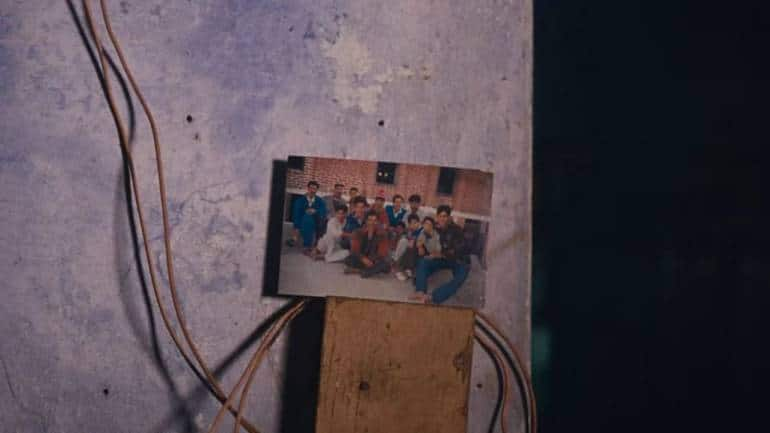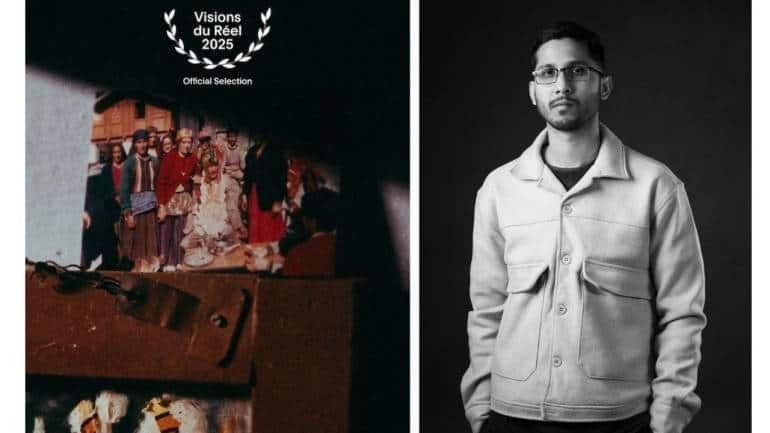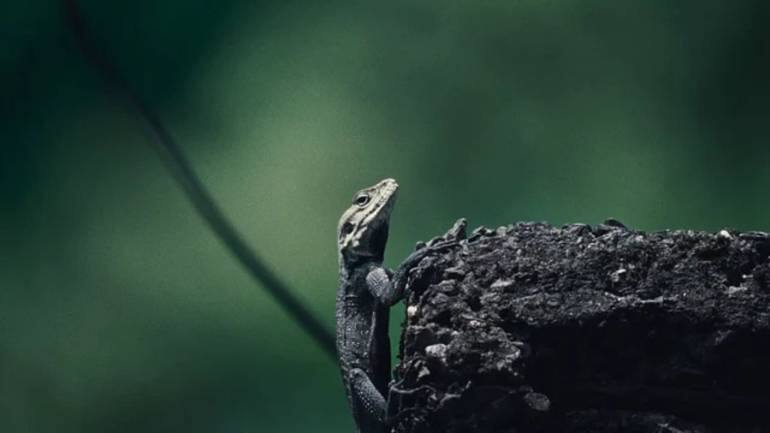



Once upon a time there stood a village, which has now drowned. This is not the story of Hindu god Krishna’s underwater Dwarka city. This is also not the story of how global warming, rising sea levels and coastal erosion engulf coastal villages, like Satyabhaya and Podampeta in Odisha, and displaced the villagers. But this is the story of many sunken Indian villages lost to the march of history, drowned and its people let-down by human development. In 1986, Kurdi village in south Goa was submerged — and its 634 families displaced — owing to the construction of the Salaulim Dam. Every summer, as the water recedes, the village emerges briefly. Two years ago, a similar fate struck the villagers of Lohari in Uttarakhand.
The ghost villages of Uttarakhand, where villagers abandon their homes to go live and work in the cities, have been documented in such non-fiction films in 2021 as Nirmal Chander’s Moti Bagh and Srishti Lakhera’s Ek Tha Gaon (Once Upon a Village). It showed the elderly who refused to leave or were left behind. The same year, Yashasvi Juyal made his Pahadi short documentary Aakhri Buransh (The Last Rhododendron), a mother-daughter story around palayan or urban migration, that won him the Gender Sensitivity Award at the Dharamshala International Film Festival.
Juyal is back with another affecting short documentary Rains Don’t Make Us Happy Anymore, which just premiered at Visions du Réel International Film Festival 2025 in Lyon, Switzerland. It tells a story of another kind of forced migration of an entire tribal village at the behest of the state — in the name of development. As they say, one man’s development is another man’s destruction. Something is really rotten in the state of Devbhoomi.
 A still from the film.
A still from the film.
In April 2022, Lohari village in the Jaunsar-Bawar area was submerged in the waters of the reservoir built as part of the Lakhwar-Vyasi hydropower project on river Yamuna (in Dehradun) and Vyasi dam, being implemented through Uttarakhand Jal Vidyut Nigam Ltd (UJVNL). The state government, according to news reports, gave the villagers of Lohari just 48 hours of notice to evacuate. Left in shock, the 77 families — belonging to Jaunsari tribe, dependent on farming and livestock rearing — were granted just two days to gather their broken selves together, pack up their lives and belongings and just leave. With nowhere to go, their future was unaccounted for. Like shooing animals out of their natural habitats, here humans were herded out of their abode, their harvested crops entirely destroyed. The villagers’ demand for rehabilitation and compensation solely in the form of “land for land” — under such Constitutional Acts as the Right to Fair Compensation and Transparency in Land Acquisition, Rehabilitation and Resettlement Act, 2013 (RFCTLARR) — was ignored. According to what locals told Mongabay, the 1972 land acquisition agreement — land for land — was conveniently forgotten.
 Yashasvi Juyal (right); a poster of his film.
Yashasvi Juyal (right); a poster of his film.
Yashasvi, who’s also the younger brother of dancer-turned-actor Raghav Juyal, displays a certain dexterity of style. Rains Don’t Make Us Happy Anymore is a layered, languid, melancholic film is a spiritual imploration, remonstrance and premonition. It is imbued with textural richness, blending mythology with history, geography with ethnography.
The epistolary format of the film’s structure reminds of Cannes and Grand Prix-winning Payal Kapadia’s L’Œil d’or/Golden Eye-winning documentary A Night of Knowing Nothing (2021), where someone who’s stayed behind narrates the story of the condition of the place around them to someone who has already left. Personal letters — timekeepers and memory records — are the finest tools for resisting hegemonic erasures and rewriting of historical truths.
Do we write love letters to the dead? This film is one such letter. It is a chronicle of a death foretold. A past that was thriving, a present that is violent, displaced and lost, and a future that is already dead. It speaks for home and the world. How rains that bring joy to parched souls elsewhere only increases the water level here, further submerging their home, existence and identity. Rains Don’t Make Us Happy Anymore is a metaphysical, elegiac lamentation for what’s lost and what we stand to lose.
A young man (voiced by Dheeraj Kumar) has stayed behind, his utterances — and the dialogic exchanges between two voices — drive the story, what he narrates/speaks are like words from the letters he writes to a young woman (voiced by Pushpa Rawat), she who has left long ago, with the rest of the villagers. Is she dead or is she living elsewhere we know not. It doesn’t matter. What matters is that she once lived here, and that connects her to him. They are co-bearers of the tragedy.
Juyal’s rootedness in his subject matter, in the specificity of the context of the story connects an ancient time with a future time, making his storytelling universal. And the refusal to forget, to stay on, to hold on to the loss, is an attempt to wrest his (Dheeraj’s/Juyal’s) memory from oblivion’s clutches. To defy the erasure of a people and their land by the mere act of remembering — remembering is revolutionary.
If Aakhri Buransh (The Last Rhododendron) delves into the generational relationship with one’s home in a village, examining themes of migration and the loss of a home, Rains Don’t Make Us Happy Anymore speaks of a loneliness of another kind, in one’s own home when that home is snatched away from you.
 A still from the film.
A still from the film.
One must talk about the architecture of the scenes that writer-director-editor Juyal stitches together like a pastiche. The film opens with a ghostly shot of a dark night, from in between the trees one sees in the distance a dam lit up with multiple lights, ironically these sparkling figurative ghosts — unlike the distant sparkling starry ghosts in Satyajit Ray’s Goopy Gyne Bagha Byne (1969) — are not here to grant any wishes of the locals, in fact on the contrary. It is by design that the narrator mentions the terror that demons like Kirmir wreaked at the very same place during the Dvapar Yug (Bronze Age).
Juyal juxtaposes the chaos of the impact of the human world with the resultant silence of nature. A half-burnt government evacuation notice stuck on a wall, the ominous JCB bulldozers like death machines swallow up land, mountains are being cut to lay roads on the one hand, while on the other hand, a upended reflection of a lone house on water, and waters mirroring standalone trees, hand-drawn animation superimposed on live shots, a Pahari miniature painting character — in a very Amit Dutta’s Nainsukh style — of a prince-like Pahadi groom on his wedding day, garland in hand, in limbo, floating in air. Is that an iteration of the likes of our young man the narrator? For he was looking for a lost ring that must have sunk in the waters. Come evenings, the dams shut the water, the fields reappear a little, the houses peak their heads for two days.
 Vyasi dam, part of Lakhwar-Vyasi hydropower project, Uttarakhand.
Vyasi dam, part of Lakhwar-Vyasi hydropower project, Uttarakhand.
Still waters run deep. Nothing runs deeper than submerged truth/realities. The seepage in washed-out walls of hollowed houses tell many a tale. The wailing echoes loud from the silent emptiness of betrayal and forced desertion. A feeling of the haunted and a palpable ache looms large over Juyal’s film. The walls of the vacant houses and school speak of drowned voices and stories. Workers have been crushed by a collapsing bridge, a dam supposed to light up half of the state (and neighbour Uttar Pradesh) dims out the life of this Uttarakhandi village forever.
There’s a spectral-like quality to the non-linear film, always drifting, like the passage of time, slipping through your fingers. The ash blue greys that colourist Mahak Gupta accentuates add a pall of melancholia to Dipesh Manral’s spectacular cinematography. Ankit Thapa’s sound design and Vinod K Ram’s recording of ambient sounds are without a fault, propelling the story.
 A still from the film.
A still from the film.
The film progresses in a fable-like way, with a lot of gravitas and empathy. It doesn’t point fingers, it laments. The disaster could be the result of enraging the Gods, says the woman’s voice. But Lohari — that which is made of loha or iron, like the weapons it was once known for in the ancient times — is said to possess iron grit to steel through harshness life throws its way. Will it survive now, too? Where are the Devs of the Devbhoomi, when its denizens were being driven out unjustifiably and left to fend for themselves? It makes you ponder whether it is the land of the gods Devbhoomi or a Dead-bhoomi — where live ghosts? The film makes you question the cost of development — who benefits and who suffers? What is gained and what gets lost?
Discover the latest Business News, Sensex, and Nifty updates. Obtain Personal Finance insights, tax queries, and expert opinions on Moneycontrol or download the Moneycontrol App to stay updated!
Find the best of Al News in one place, specially curated for you every weekend.
Stay on top of the latest tech trends and biggest startup news.